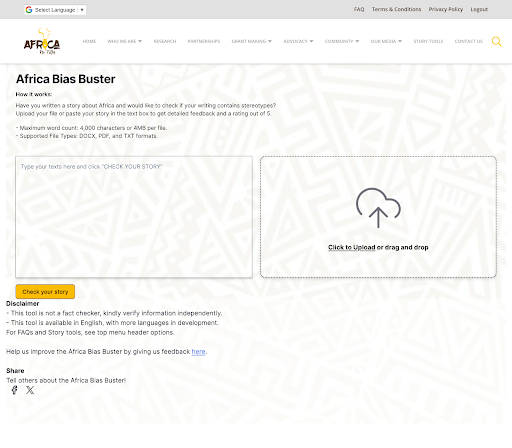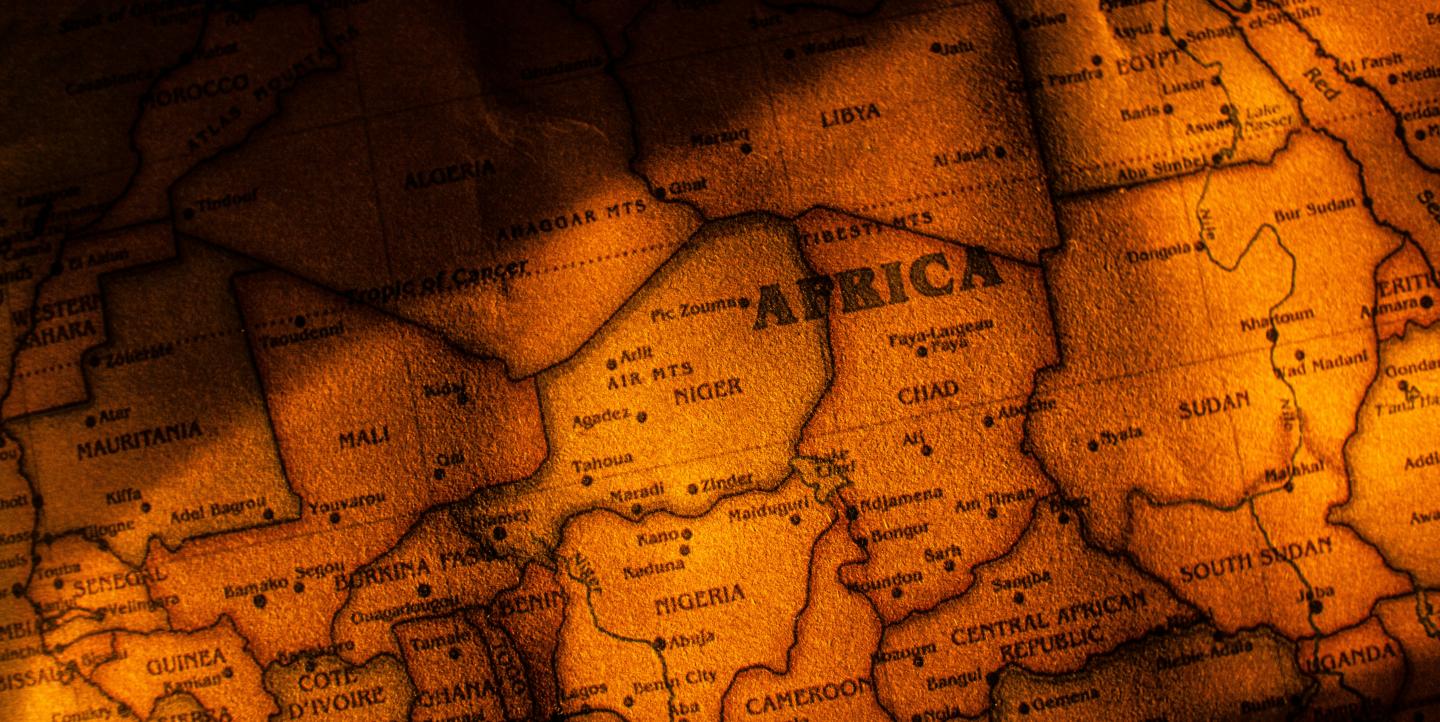In his 2005 satirical piece, “How to Write About Africa,” the late Kenyan author Binyavanga Wainaina explored how the Western gaze in media perpetuates a distorted view of Africa. “Always use the word ‘Africa’ or ‘Darkness’ or ‘Safari’ in your title,” he wrote. “Subtitles may include the words ‘Zanzibar’, ‘Masai’, ‘Zulu’, ‘Zambezi’, ‘Congo’, ‘Nile’, ‘Big’, ‘Sky’, ‘Shadow’, ‘Drum’, ‘Sun’ or ‘Bygone’.”
Wainaina pinpointed the tendency for stereotypical narratives that have plagued Africa and its people for centuries to rely on vague, broad descriptions because “your reader doesn’t care about all that.”
In an effort to counter these narratives, Africa No Filter (ANF) and The AI Shop collaborated to create the Africa Bias Buster, an AI-powered tool that helps writers screen their work for the stereotypes and biases that have been peddled about the continent. The tool analyzes uploaded text, rates it on a scale of one to five, and provides pointers on how to improve.
Bias about Africa
It has been two decades since Wainaina put pen to paper, and the playing field has leveled a bit thanks to the rise of social media. People who previously existed on the margins are more able to tell their own stories. Africans are not “too busy starving and dying and warring and emigrating to read your book,” and instead have access to communicate the displeasure they have long held about the unfair portrayal of their continent – a displeasure that has been ignored.
Africa No Filter has been on the war path to dismantle these narratives since its founding, through research, fellowships and its news syndication service, bird. In the organization’s latest report “Stereotypes About Africa in Britain and the United States: A Social-Psychological Study of Their Impact on Engagement with Africa” the authors found that Wainaina’s evaluation still holds true: the stereotypical narratives held about Africans are in effect today with a majority of participants associating Africa with animals and nature, corruption and poverty.
These stereotypes hold economic weight. Another report by ANF and Africa Practice shows that Africa could be losing up to $4.2 billion annually from overinflated interest rates on the loans they take from wealthier countries. This is due in large part to the stereotypical, negative news coverage of the continent that decreases investors’ appetites for risk.
It’s not just Western media that is guilty of furthering these biases. One of ANF’s first research reports assessed how African media covers Africa. It found that local journalism in the 15 African countries surveyed lacked nuance due to a dearth of resources, causing their coverage to fall in line with the Western ideologies of the news agencies that African news outlets rely on for a third of all their stories.
ANF later released a report with the following tips for writing about Africa:
- Challenge unequal power relations
- Ensure respectful engagements
- Tackle implicit bias in the hiring process
- Address implicit bias in storytelling
- Use ethical guidelines and understanding informed consent correctly
- Understand the local context
- Invest time in your projects
- Invest in your people
The Africa Bias Buster
ANF and The AI Shop created the Africa Bias Buster primarily to assist writers on the continent. “The first target for the tool for us were the storytellers in our community. At Africa No Filter we enable the advocacy that we do through this tool,” said Abimbola Ogundairo, ANF’s advocacy and campaigns lead.

ANF approached The AI Shop to develop the tool using training data pulled from writing samples by journalists and development professionals during a course on how to write about Africa. The training focused on subtle, nuanced biases rather than overt ones, and the samples highlighted the agency of communities versus portraying them solely as recipients of aid.
The team used OpenAI’s GPT4 as the model for the tool. The star rating system was determined through discussion between Africa No Filter and The AI Shop, with clear definitions for each star level provided to the language model.
Before it was released publicly, colleagues from Africa No Filter and others tested the tool for two months and provided feedback to refine it. “It was really a question of just making the tool available for people to use and encouraging them to give us candid feedback, using that feedback to modify and adjust the code where it was necessary. This has been an iterative thing for us all through,” said Ekow Duker, co-founder of The AI Shop.
A privacy concern that has emerged is that the text that users upload is retained “for future reference” but not to retrain the model. This may be a drawback for some journalists who may not want to give away confidential information to be stored somewhere they don’t have access to or control over.
Decolonizing storytelling through AI
How possible is it for AI tools to solve such a complex problem as the Africa Bias Buster has set out to do? “I think they have a role to play,” said George Ogola, professor of media industries at University of Nottingham. “But I think it's equally important that we think about the broader structural factors that facilitate the kind of bias that has been sort of institutionalized basically in the narration of Africa as a story.”
Journalists in Ghana, South Africa, Zambia, Namibia, Kenya, Tanzania, Uganda and Ethiopia are all using AI to analyze images, transcribe interviews, generate and fact-check content, collect information, edit, translate text, and visualize data. Although generative AI tools like ChatGPT are helpful and free, they have been found to be less effective for users in Africa due to the Western-centric data they are trained on, and a lack of widespread policy and ethical guidelines for newsrooms using AI on the continent.
According to Ogola, who is writing a book on AI in journalism in Africa, AI tools are a useful intervention, particularly those localized to address cultural complexities. They should not be seen as the sole answer, however. Overreliance on technology is problematic, as is the fact that many AI tools are trained on Western data.
Ogola suggested that, although challenging due to state control and prohibitive cost, contextually relevant African data is needed to train effective AI tools. He also stressed the importance of transparency in AI tool development and public participation in policymaking around AI regulation in Africa.
What's next
Currently available in English, future iterations of the Africa Bias Buster may include Portuguese and French. “We would just need to be very careful to bring in testers who understand the nuances of the language,” noted Duker.
The developers plan to continuously refer to user feedback to improve the tool. Based on user demand, they may integrate the tool into other online platforms.
“We’ve displayed the tool at the Africa Media Festival 2025 in Nairobi, the AI Expo in South Africa, the EU Voice program 2024 in Belgium, and the Africa Health Agenda International Conference in Kigali,” said Ogundairo. “So far I would say people see a lot of value in it, whether they are from within the continent or outside.”
Photo by Road Ahead on Unsplash.


